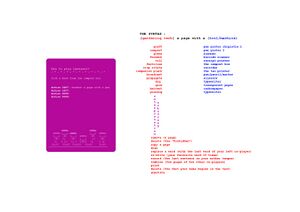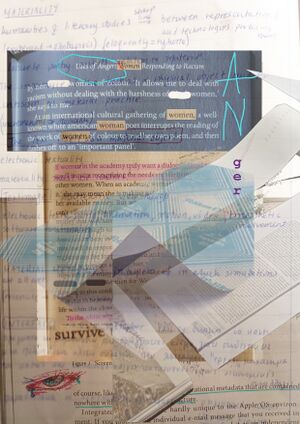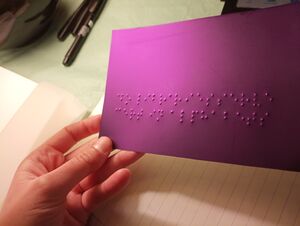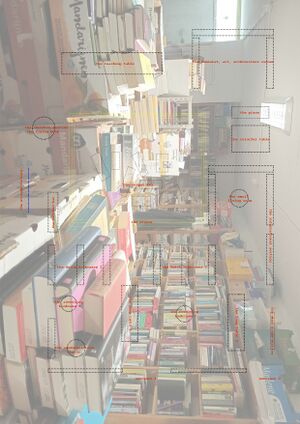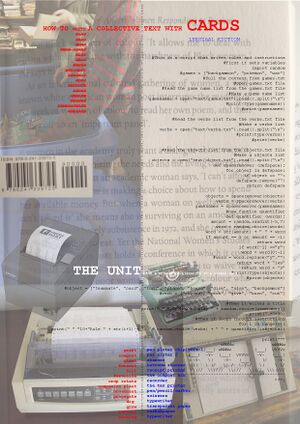How do We Library That???: Difference between revisions
No edit summary |
|||
| Line 1: | Line 1: | ||
[[File:The card - the syntax.jpg|thumb]] | [[File:The card - the syntax.jpg|thumb]] | ||
[[File:The transforation of the unit.jpg|thumb]] | [[File:The transforation of the unit.jpg|thumb]] | ||
[[How Do We Library That?|'''How Do We Library That?''']] | [[How Do We Library That?|'''How Do We Library That?''']] | ||
| Line 19: | Line 16: | ||
* -I very much agree! | * -I very much agree! | ||
A small conversation between two readers. A non-time and non-site conversation. The book becomes the reference point - reinvents the time and the space of this relation-constitutes a small universe. | A small conversation between two readers. A non-time and non-site conversation. The book becomes the reference point - reinvents the time and the space of this relation-constitutes a small universe.[[File:Libraille.jpg|thumb|''Do libraries serve certain alphabets?''|left]]------------------------------------------------------------- | ||
==== sensorship / lybraille-e ==== | |||
or lyi(brar)ing down in the margin (degrees of representation- there is a diagram at the paper of Olson "Mapping beyond Dewey's Boundaries") | |||
see also: digitizing/printing, being kind to the reader, republishing | see also: digitizing/printing, being kind to the reader, republishing | ||
see also: censorship, including/excluding | see also: censorship, including/excluding | ||
All reading is a form of touching, and the act creates a connection between the reader and the text. Some texts encourage reading from certain readers (such as those typeset in braille), while some attempt to be universally accessible (such as those using OCR-A and OCR-B fonts). | |||
All reading is a form of touching, and the act creates a connection between the reader and the text. Some texts encourage reading from certain readers (such as those typeset in braille), while some attempt to be universally accessible (such as those using OCR-A and OCR-B fonts). | |||
Apparently the title "The Medium is the Massage" was in fact a typo after being sent to the typesetter, but McLuhan liked it so much that it was kept. Massage and also Mass Age alongside the original Message and Mess Age suggest multiple ways of approaching the text. | Apparently the title "The Medium is the Massage" was in fact a typo after being sent to the typesetter, but McLuhan liked it so much that it was kept. Massage and also Mass Age alongside the original Message and Mess Age suggest multiple ways of approaching the text. | ||
Maybe the text can go: Do libraries only serve certain alphabets? | Maybe the text can go: Do libraries only serve certain alphabets? | ||
==== Reimaging together the library as a structure/institution/entity- the Hero and the CarrierBag Library ==== | ==== Reimaging together the library as a structure/institution/entity- the Hero and the CarrierBag Library ==== | ||
| Line 90: | Line 83: | ||
===== '''Carrier Bag Library''' ===== | ===== '''Carrier Bag Library''' ===== | ||
[[File:Leeszaal map.jpg|thumb|Leeszaal map]] | |||
What is the economy of knowledge? How knowledge was produced and distributed in the Carrier Bag library? | What is the economy of knowledge? How knowledge was produced and distributed in the Carrier Bag library? | ||
| Line 100: | Line 94: | ||
flexible, open, adjustable, circular, limitless (can add and add and add and transform), without borders, liquid or smooth textured, horizontal, people make their own decisions/terms of classification/organization | flexible, open, adjustable, circular, limitless (can add and add and add and transform), without borders, liquid or smooth textured, horizontal, people make their own decisions/terms of classification/organization | ||
A bag where people add as much as take away, where the mastery of knowledge is less important than the sharing of information, mutual knowledge | A bag where people add as much as take away, where the mastery of knowledge is less important than the sharing of information, mutual knowledge[[File:How to play the collective text Leeszaal Edition.jpg|thumb]]Leeszaal (no checkout, relationship built on trust and knowledge not seen as private propriety) Within a society of surplus, book donation makes sense | ||
Leeszaal (no checkout, relationship built on trust and knowledge not seen as private propriety) Within a society of surplus, book donation makes sense | |||
looks like a net (network), each part is connected to each other, through knots _ nodes (some small, some bigger) | looks like a net (network), each part is connected to each other, through knots _ nodes (some small, some bigger) | ||
Revision as of 14:37, 2 April 2023
ή πως το ουσιαστικό μετατρέπεται σε ρήμα/σε ενέργεια? What is a Library?/ How someboby libraries? the library is a place, a storage, a sphere, politics, relations, power, authority, containt, data, archive, history? But which history? How many histories exist?
Library Tour
Making Cards the first cards
----> talking notes | notes talking
Boyana, Suzan and Aglaia started their tour by visiting the Central Library of Rotterdam on Friday. They went to the third floor to search for some inernational books. Wandering around at the english section Suzan picked the book Queer: LGBTQ writing from Ancient Times to yesterday edited by Grank Wynne. She started leafing through when suddenly came across a notes' discussion-a small square piece of paper:
- -Good choice!
- -I very much agree!
A small conversation between two readers. A non-time and non-site conversation. The book becomes the reference point - reinvents the time and the space of this relation-constitutes a small universe.
-------------------------------------------------------------
sensorship / lybraille-e
or lyi(brar)ing down in the margin (degrees of representation- there is a diagram at the paper of Olson "Mapping beyond Dewey's Boundaries")
see also: digitizing/printing, being kind to the reader, republishing
see also: censorship, including/excluding
All reading is a form of touching, and the act creates a connection between the reader and the text. Some texts encourage reading from certain readers (such as those typeset in braille), while some attempt to be universally accessible (such as those using OCR-A and OCR-B fonts).
Apparently the title "The Medium is the Massage" was in fact a typo after being sent to the typesetter, but McLuhan liked it so much that it was kept. Massage and also Mass Age alongside the original Message and Mess Age suggest multiple ways of approaching the text.
Maybe the text can go: Do libraries only serve certain alphabets?
Reimaging together the library as a structure/institution/entity- the Hero and the CarrierBag Library
Hero Library
What is the economy of knowledge? How knowledge was produced and distributed in the hero library?
you have to pay something in order to get access, earn it. you have to be able to afford it.
it's exclusive not inclusive
cannon - 1/ power - 2/ wealth - 3/ growth
hero's library would be monumental with columns.
silent
how do you make a library start and end
limited access (physical or non-physical, stairs or paywall)What is the economy of knowledge? How is knowledge distributed and produced?
the same translates to non-phisical spaces but digital libraries too. subscription models and levels of access
special cards and special treatments and monumental large scale concrete/marble/stone buildings.. the few privileged ones get the most special knowledge the most valuable.. what is the most valuable knowledge? who are the privileged ones? how did they manage to acheive this? the top? UP/VERTICAL, surveillance and control, aesthetics of power (regarding the construction)---maybe the knowledge itself has to do with the consumption/we consume knowledge/information we do not create/produce
no non-silent rooms or group working areas
obedience
the knowledge is rather taken (acquired) from somewhere else
, many levels from bottom to the top. the higher you go the most important stuff you can access (the most valuable knowledge)
big history section on victories
censorship?
security
many mirrors inside
property/ ownership of knowledgement
Hero's library slogan:
hoc est quod vos adepto
echo chamber (Stephen)
-there may be many replicas of the same book. "the bible of the hero library" rewritten, how to read "the bible of the hero library", new edition, new cover etc.
there can only be one hero library (with notion to capitalism as Bo said)
Carrier Bag Library
What is the economy of knowledge? How knowledge was produced and distributed in the Carrier Bag library?
free access, exchangeable, everyone has the same
you could request books depending on your research
what monuments could there be?maybe no static monuments.. maybe counter monuments-always vulnerable and transformative
flexible, open, adjustable, circular, limitless (can add and add and add and transform), without borders, liquid or smooth textured, horizontal, people make their own decisions/terms of classification/organization
A bag where people add as much as take away, where the mastery of knowledge is less important than the sharing of information, mutual knowledge
Leeszaal (no checkout, relationship built on trust and knowledge not seen as private propriety) Within a society of surplus, book donation makes sense
looks like a net (network), each part is connected to each other, through knots _ nodes (some small, some bigger)
infinite?
no checkout policy
mobile and it can change place
Who has ownership over the objects?
open to risks- but easy to reconstruct due to collectivity (knowledge is fluid)
living form/changing constantly- knowledge to find solutions
bags made of reeds
what happens if a carrier bag librarian walks into a hero library? what would give them away?
^^^this sounds like the start of a joke
what are the rules in a carrier bag library? who decides the rules, are they fixed?
An archive that is not static, is only useful if it's useful to users
"May be seen as necessary elements of a whole, which itself cannot be characterised either as conflict or as harmony since its purpose is neither resolution nor stasis but continuing process" - LeGuin on carrier bags
There can be more than one carrier library in contrast to capitalism.
Carrier bag library slogan(s):
Donna Harraway (riffing on Ursula LeGuin's HBToF):
“It matters what matters we use to think other matters with; it matters what stories we tell to tell other stories with; it matters what knots knot knots, what thoughts think thoughts, what descriptions describe descriptions, what ties tie ties. It matters what stories make worlds, what worlds make stories.”
― Donna J. Haraway, Staying with the Trouble: Making Kin in the Chthulucene

